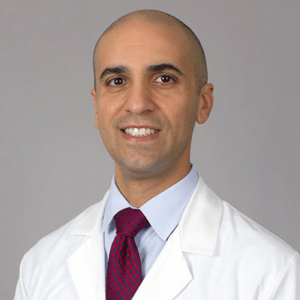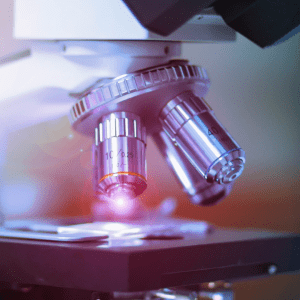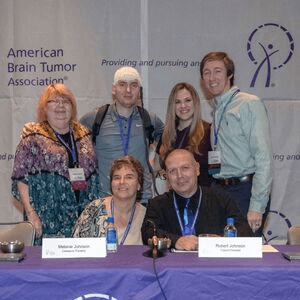
Nearly 600 patients, survivors, caregivers, medical professionals, researchers, and industry representatives participated in the American Brain Tumor Association 2019 National Conference – the largest turnout in the ABTA’s history of the national brain tumor meeting. This historical attendance was made possible by high-quality programming and affordable access to the conference.
This year, participants could attend two days of educational sessions and events for $40 per patient or caregiver – a savings of over 70% from previous registration fees. Hundreds more joined the National Conference free-of-charge via livestream on September 6.
“We are thankful for the generous support of our conference sponsors,” said Ralph DeVitto, president and CEO of the ABTA. “With their support, we were able to expand the reach of this educational event to patients and caregivers across the country, and provide crucial information into the hands of the brain tumor community.”
High-Impact Programming
National Conference Co-Chairs Erin M. Dunbar, MD of Piedmont Brain Tumor Center and Jeffrey S. Wefel, PhD, ABPP of The University of Texas MD Anderson Cancer Center led the program, which focused on opportunities to connect, learn and engage through educational events for patients, survivors, caregivers and families. Attendees joined the conference in person and online, from across the country and around the world, for 25 interactive, educational sessions and events. Conference participants customized their agenda from eight different breakout sessions, as well as connected with medical experts and researchers, through six networking opportunities. Attendees heard from leading experts at major treatment centers on timely topics, such as precision medicine, medical cannabis use, maximizing cognitive function, and adapting to physical challenges, among others.
“Two Thumbs Up,” Says Conference Participants
Conference attendees touted the experiences shared on the interactive panel, “Living with a Brain Tumor: Patient & Caregiver Panel.” Three patient-caregiver pairs, Steven and Jordan Rhoads, Robert and Melanie Johnson, and Timothy and Valerie Hoehnke, delved into real-life experiences of managing a brain tumor – from diagnosis to treatment and beyond – and the day-to-day challenges of caring for their loved ones.
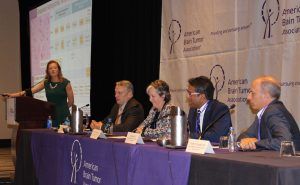
Participants were also enthralled to hear the “behind-the-scenes” discussions of medical teams on how they collectively approach treatment and care for patients diagnosed with a brain tumor in the “Brain Tumor Board Panel & Q&A,” facilitated by Dr. Dunbar.
Inspiring conference attendees through humor, moving moments and lessons learned, Patient Advocate and 2019 National Conference Keynote Speaker Kelsey Tainsh shared her personal experience growing up and overcoming the challenges presented by her brain tumor diagnosed at age 5 and her second brain tumor diagnosed 10 years later.
At the Forefront of Supporting Brain Tumor Research
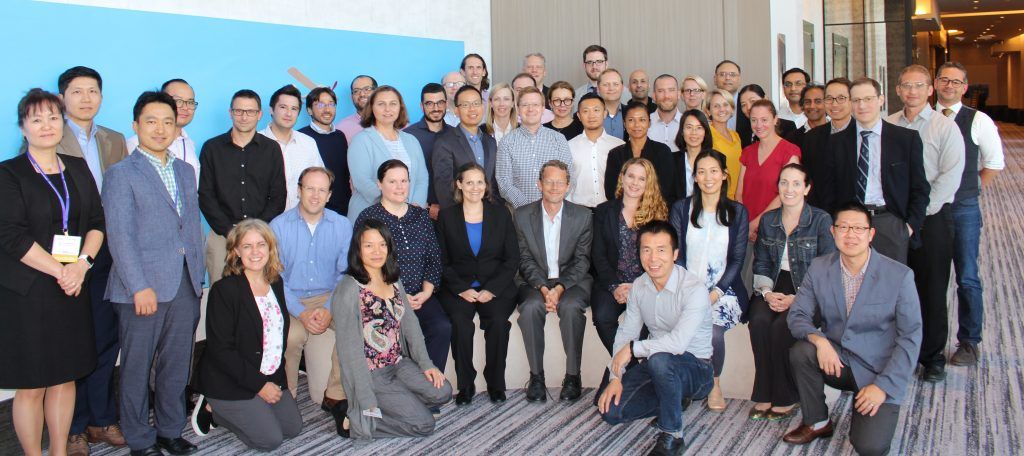 New this year, the 2019 National Conference joined the patient-caregiver educational meeting with the ABTA Alumni Research Network Annual Meeting (AARN), which convenes brain tumor researchers funded by the ABTA to increase information-sharing of the latest science. This meeting has successfully generated more diverse research opportunities for brain tumors. The researchers’ program at the National Conference, co-chaired by Craig M. Horbinski, MD, PhD of Northwestern Medicine Feinberg School of Medicine and Kyuson Yun, PhD of Houston Methodist Research Institute, was attended by 49 researchers from 33 institutions from as far as Spain and South Korea and two international speakers from Canada and the United Kingdom.
New this year, the 2019 National Conference joined the patient-caregiver educational meeting with the ABTA Alumni Research Network Annual Meeting (AARN), which convenes brain tumor researchers funded by the ABTA to increase information-sharing of the latest science. This meeting has successfully generated more diverse research opportunities for brain tumors. The researchers’ program at the National Conference, co-chaired by Craig M. Horbinski, MD, PhD of Northwestern Medicine Feinberg School of Medicine and Kyuson Yun, PhD of Houston Methodist Research Institute, was attended by 49 researchers from 33 institutions from as far as Spain and South Korea and two international speakers from Canada and the United Kingdom.
This joint effort increased access between patients, caregivers and researchers. Patients and caregivers met and mingled with 20 ABTA grant-funded researchers at a special networking reception that exhibited the latest brain tumor research projects.
This effort has led to a number of critical opportunities:
- Access and analysis of genetic information – Scientists understand the value of including genetic information on brain tumors in their research, but analyzing the vast amounts of data available is a challenge. Attendees were given a demonstration of GlioVis, a software tool created by an AARN member, which makes genetic data available for brain tumor researchers in a way that simplifies the analysis.
- Future collaborative research projects – AARN members are combining their expertise to address some of the challenges in brain tumor research. The ABTA will be at the forefront of helping scientists grow their collaboration by offering travel grants to visit each others’ laboratories.
- More direct exchange between patients, caregivers and researchers – AARN members heard from a patient and his caregiver about their experience along the brain tumor journey. AARN members engaged with a patient and caregiver pair, asked questions, as well as answered some questions about brain tumor research.
What’s Up Next?
The ABTA National Conference was designed to maximize engagement, empowerment and wellness all along the brain tumor journey on a national scale. The 2020 National Conference will be announced soon. In the meantime, 2019 conference materials, including slide presentations, recorded livestream sessions and transcripts will be available for download in late Fall 2019.
To be notified of the 2019 National Conference materials, the 2020 National Conference or Regional Patient and Family Meetings, please sign up for upcoming notifications.


